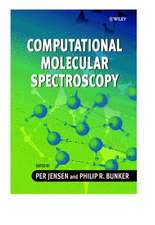Fundamentals of Molecular Symmetry: Series in Chemical Physics
Autor P.R. Bunkeren Limba Engleză Paperback – noi 2004
Molecular symmetry is an easily applied tool for understanding and predicting many of the properties of molecules. Traditionally, students are taught this subject using point groups derived from the equilibrium geometry of the molecule.
Fundamentals of Molecular Symmetry shows how to set up symmetry groups for molecules using the more general idea of energy invariance. It is no more difficult than using molecular geometry and one obtains molecular symmetry groups.
The book provides an introductory description of molecular spectroscopy and quantum mechanics as the foundation for understanding how molecular symmetry is defined and used. The approach taken gives a balanced account of using both point groups and molecular symmetry groups. Usually the point group is only useful for isolated, nonrotating molecules, executing small amplitude vibrations, with no tunneling, in isolated electronic states. However, for the chemical physicist or physical chemist who wishes to go beyond these limitations, the molecular symmetry group is almost always required.
| Toate formatele și edițiile | Preț | Express |
|---|---|---|
| Paperback (1) | 575.63 lei 6-8 săpt. | |
| CRC Press – noi 2004 | 575.63 lei 6-8 săpt. | |
| Hardback (1) | 1022.06 lei 6-8 săpt. | |
| CRC Press – 28 iun 2018 | 1022.06 lei 6-8 săpt. |
Preț: 575.63 lei
Preț vechi: 677.22 lei
-15% Nou
Puncte Express: 863
Preț estimativ în valută:
110.16€ • 113.80$ • 91.68£
110.16€ • 113.80$ • 91.68£
Carte tipărită la comandă
Livrare economică 26 martie-09 aprilie
Preluare comenzi: 021 569.72.76
Specificații
ISBN-13: 9780750309417
ISBN-10: 0750309415
Pagini: 358
Ilustrații: 1, black & white illustrations
Dimensiuni: 156 x 234 x 18 mm
Greutate: 0.66 kg
Ediția:1
Editura: CRC Press
Colecția CRC Press
Seria Series in Chemical Physics
ISBN-10: 0750309415
Pagini: 358
Ilustrații: 1, black & white illustrations
Dimensiuni: 156 x 234 x 18 mm
Greutate: 0.66 kg
Ediția:1
Editura: CRC Press
Colecția CRC Press
Seria Series in Chemical Physics
Public țintă
UndergraduateRecenzii
Winner of a 2005 CHOICE Outstanding Academic Book Award!
"For more than 25 years, Molecular Symmetry and Spectroscopy … and the subsequent second edition … have been this reviewer's most trusted authority and treasured references on the role of symmetry in molecular spectroscopy … . The book starts with a beautifully concise yet complete review of spectroscopy and quantum mechanics … . A fine balance is struck in the level of detail provided. … Summing up: highly recommended."
- CHOICE Reviews online
"This book provides a welcome slant on molecular symmetry, for those who worry that rigid ball and stick point group arguments to ignore the geometrical distortions accompanying molecular vibrations. In summary, this book is welcome, first as an illuminating graduate text and also as an addition to the shelves of anyone who is responsible for teaching molecular symmetry at whatever level."
- Mark Child, Chemistry World, March 2005
"This book is of primary importance in training new scientists in the field of molecular spectroscopy and quantum chemistry, i.e., in branches of modern science that attract increasing interest nowadays. It is particularly important that reading this book helps readers to form their correct general scientific philosophy."
- Dr. Yurii N. Panchenko, Moscow State University, Russia
"As a resource for a starting out research students and other workers in electronic structure and bonding and high resolution spectroscopy it would serve as a very useful introduction to the more advanced aspects of symmetry. It would be a welcome presence on the research lab bookshelves, and would hopefully show signs of much use."
– Nigel A. Young, Department of Chemistry, University of Hull, in Physical Sciences Educational Review, Vol. 6, No. 1
"Fundamentals of Molecular Symmetry is an excellent book. …The title thus belies the true content of the book; it covers so much more than most other books on molecular symmetry. As such it should be an essential text for any graduate student or established researcher working in the area of high-resolution spectroscopy. …Fundamentals of Molecular Symmetry is exceptionally well written and up to the very high standards set by the authors in their previous texts. It is clearly written and the figures and diagrams are beautifully produced. There are numerous figures of orbital shapes, energy-level diagrams and molecular spectra. Readers will also particularly appreciate the way each concept is illustrated by examples of application to real molecular systems. Fundamentals of Molecular Symmetry has my unqualified recommendation."
-Dr. D. Smith, Contemporary Physics
"For more than 25 years, Molecular Symmetry and Spectroscopy … and the subsequent second edition … have been this reviewer's most trusted authority and treasured references on the role of symmetry in molecular spectroscopy … . The book starts with a beautifully concise yet complete review of spectroscopy and quantum mechanics … . A fine balance is struck in the level of detail provided. … Summing up: highly recommended."
- CHOICE Reviews online
"This book provides a welcome slant on molecular symmetry, for those who worry that rigid ball and stick point group arguments to ignore the geometrical distortions accompanying molecular vibrations. In summary, this book is welcome, first as an illuminating graduate text and also as an addition to the shelves of anyone who is responsible for teaching molecular symmetry at whatever level."
- Mark Child, Chemistry World, March 2005
"This book is of primary importance in training new scientists in the field of molecular spectroscopy and quantum chemistry, i.e., in branches of modern science that attract increasing interest nowadays. It is particularly important that reading this book helps readers to form their correct general scientific philosophy."
- Dr. Yurii N. Panchenko, Moscow State University, Russia
"As a resource for a starting out research students and other workers in electronic structure and bonding and high resolution spectroscopy it would serve as a very useful introduction to the more advanced aspects of symmetry. It would be a welcome presence on the research lab bookshelves, and would hopefully show signs of much use."
– Nigel A. Young, Department of Chemistry, University of Hull, in Physical Sciences Educational Review, Vol. 6, No. 1
"Fundamentals of Molecular Symmetry is an excellent book. …The title thus belies the true content of the book; it covers so much more than most other books on molecular symmetry. As such it should be an essential text for any graduate student or established researcher working in the area of high-resolution spectroscopy. …Fundamentals of Molecular Symmetry is exceptionally well written and up to the very high standards set by the authors in their previous texts. It is clearly written and the figures and diagrams are beautifully produced. There are numerous figures of orbital shapes, energy-level diagrams and molecular spectra. Readers will also particularly appreciate the way each concept is illustrated by examples of application to real molecular systems. Fundamentals of Molecular Symmetry has my unqualified recommendation."
-Dr. D. Smith, Contemporary Physics
Cuprins
PART 1: SPECTROSCOPY AND THE QUANTUM STATES OF MOLECULES Molecular spectroscopy Quantum mechanics Electronic states Vibrational states Rotational states PART 2: SYMMETRY AND SYMMETRY GROUPS Geometrical symmetry The symmetry of the Hamiltonian The symmetry of rigid molecules PART 3: APPLICATIONS OF SYMMETRY Nuclear spin, statistical weights and hyperfine structure The symmetry of electronic wavefunctions The symmetry of rotation-vibration wavefunctions Symmetry selection rules for optical transitions The symmetry groups of non-rigid molecules PART 4: OTHER SYMMETRIES AND SYMMETRY VIOLATION Other symmetries Symmetry violation APPENDIX A: Answers to selected problems APPENDIX B: Character tables APPENDIX C: Books for further reading
Descriere
Fundamentals of Molecular Symmetry shows how to set up symmetry groups for molecules using more fundamental ideas. The book provides an introductory description of MS and quantum mechanics to show how MS is to be understood and used. The approach taken gives a balanced account of both types of symmetry group. Point group symmetry is derived by approximation from MS group symmetry. Usually the point group is only useful for isolated, nonrotating molecules, executing small amplitude vibrations in isolated electronic states. However, for the chemical physicist or physical chemist who wishes to go beyond these limitations, the MS group is almost always required.







